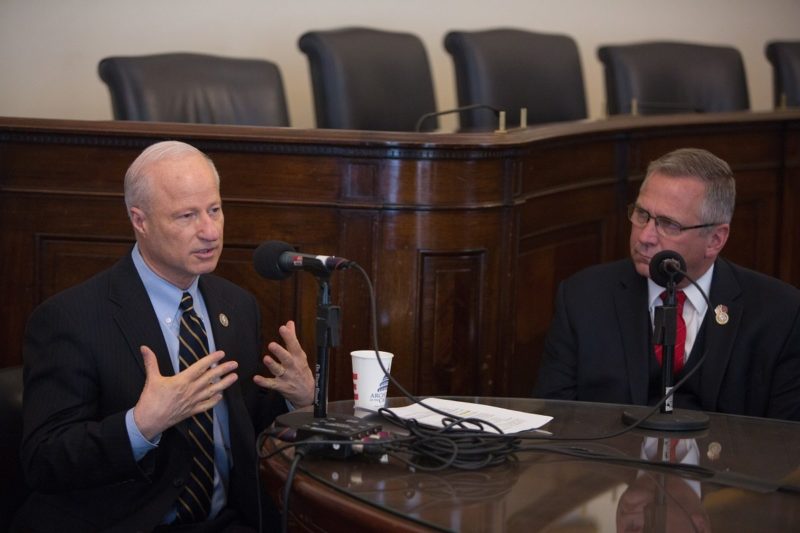Congressman in Colorado Swing District Backpedals on Extreme Anti-Choice Positions
Republican U.S. Rep. Mike Coffman, who once supported radical anti-choice proposals like a "personhood" law, has slowly but surely softened his stance against abortion rights.

U.S. Rep. Mike Coffman (R-CO) stood in front of a packed town hall meeting this month and fielded a question about whether he’d cut federal funds for abortion care and other programs that aren’t the government’s “responsibility.”
“Well,” he replied quickly, “There’s not taxpayer funding for abortion.”
That’s not a position Coffman took five years ago when he co-sponsored the “No Taxpayer Funding for Abortion Act,” which aimed to “prohibit taxpayer funded abortion.”
Due to the discriminatory Hyde Amendment, federal funds can’t be used for abortion, unless a pregnant person’s life is in danger or they have been a victim of rape or incest.
Coffman’s 2011 bill aimed to narrow the federal definition of rape, limiting it to “forcible” rape, and therefore potentially stopping federal funds from going to victims of date rape, statutory rape, and other sexual assault.
Coffman’s office did not return a call seeking to know if he regrets his cosponsorship of the No Taxpayer Funding for Abortion Act.
Coffman remains anti-choice, but his comment about federal abortion funding follows a pattern of moving away from the ideological anti-abortion positions that once defined him, as he’s settled into a district that was re-drawn to became much more competitive after the 2010 Census.
Since then, he’s stopped supporting proposals for radical “personhood” abortion bans, which would give legal rights to fertilized eggs, also called zygotes. He’s backed exceptions to his previous stance against all abortion.
After voting repeatedly to defund Planned Parenthood, Coffman used a Planned Parenthood Action Fund logo in a 2014 campaign advertisement. Then he voted again, for the sixth time, to rescind federal funds from the health-care organization the next year.
Coffman’s shifting positions are seen by pro-choice advocates and state political observers as evidence that his anti-abortion views are a liability in a competitive district, which he has won three times in a row, starting in 2012.
Still, Coffman’s district, which includes major Denver suburb Aurora, is considered “competitive” for 2018, in the category of “Republican Toss Up,” according to the Cook Political Report.
“Congressman Coffman’s seemingly constant shift on this issue isn’t much of a surprise,” Karen Middleton, executive director of NARAL Pro-Choice Colorado, told Rewire via email. “Republican elected officials do not reflect pro-choice Republican voters, who have voted with us to defeat personhood, but otherwise stay silent. As those voters see draconian federal policy shifts, they are speaking up. Stripping family planning funding, for example, is an overreach. Coffman’s flip-flop from redefining rape for abortion coverage to whatever it is now likely means he is recognizing that being anti-choice in Colorado is a liability. His current position appears to be ‘multiple choice.'”
Cristina Aguilar, executive director of Colorado Organization for Latina Opportunity and Reproductive Rights (COLOR), told Rewire that Coffman may have been influenced by hearing the “real stories of people from his district,” which is known for its international population.
“It is important that we continue to tell our stories and to help lawmakers to understand the real lives of people who are seeking abortion,” Aguilar said. “This helps them to understand that it is not the place of lawmakers to interfere with personal decisions and creates empathy for people who are working to manage their health, plan their families and make the decisions that are best for them. We can challenge policymakers who buy into the rhetoric and go along with harmful political agendas by sharing our experiences and urging them to support the rights, health, and dignity of our families and our communities.”
Coffman has distanced himself from the Christian right on LGBTQ issues. He was a strong opponent of letting LGBTQ people serve openly in the military, but he said this month that he now sees no problems with this.
